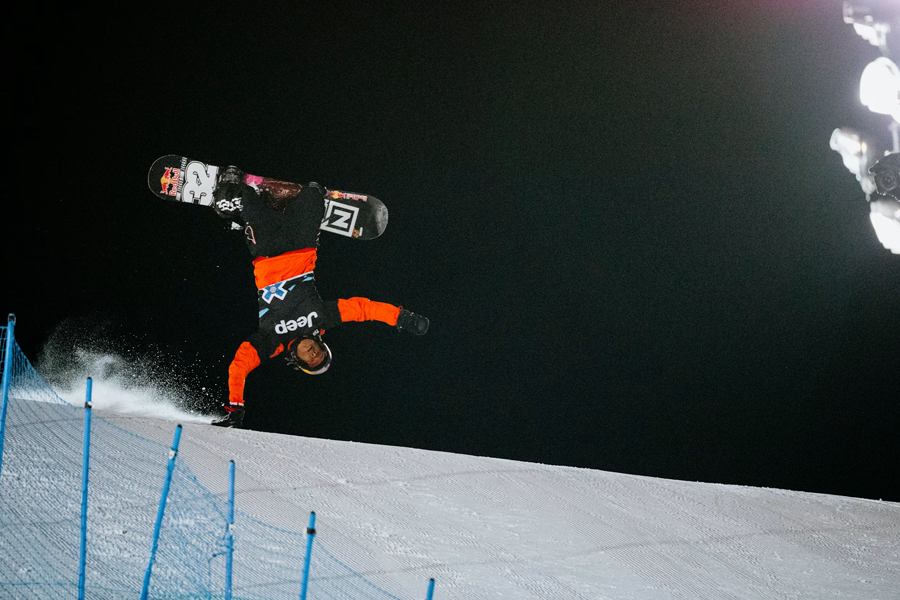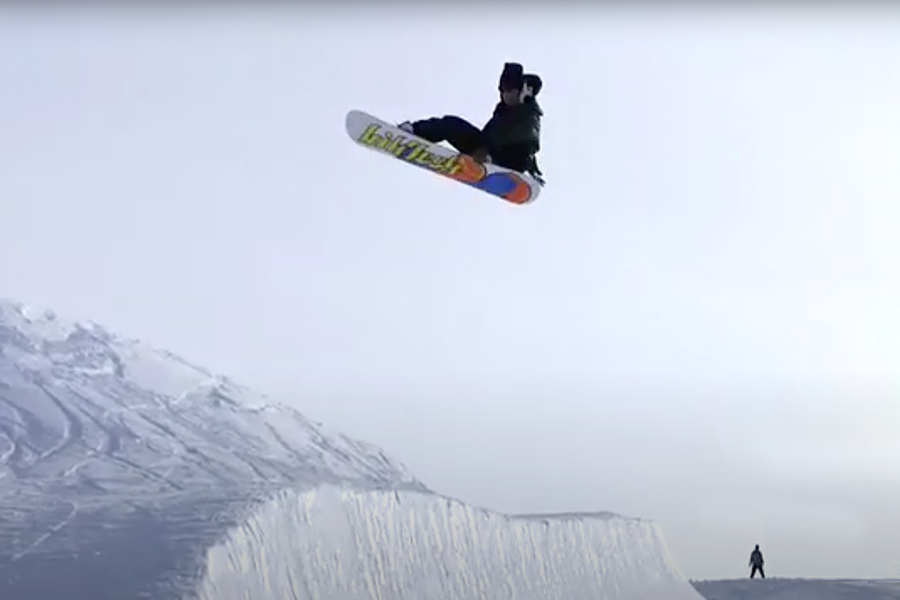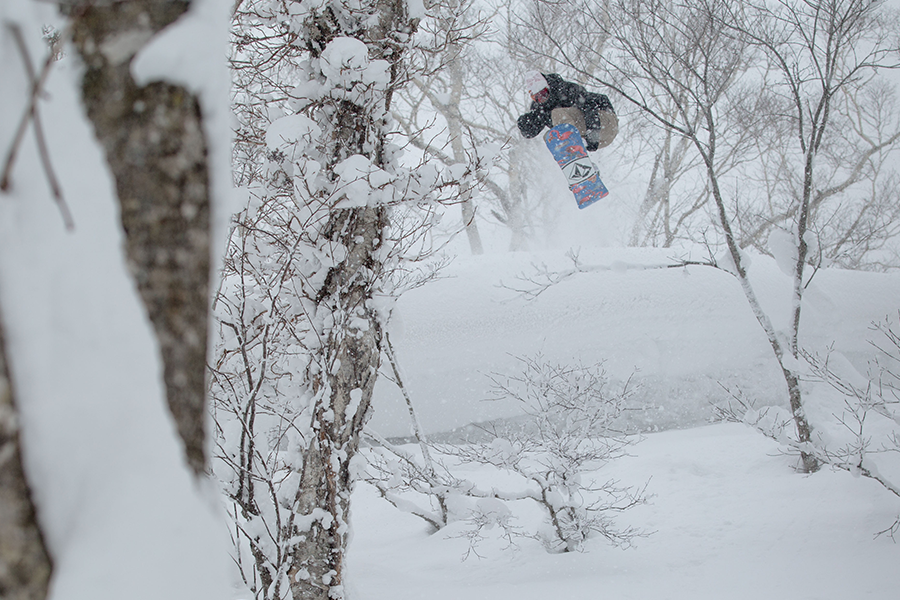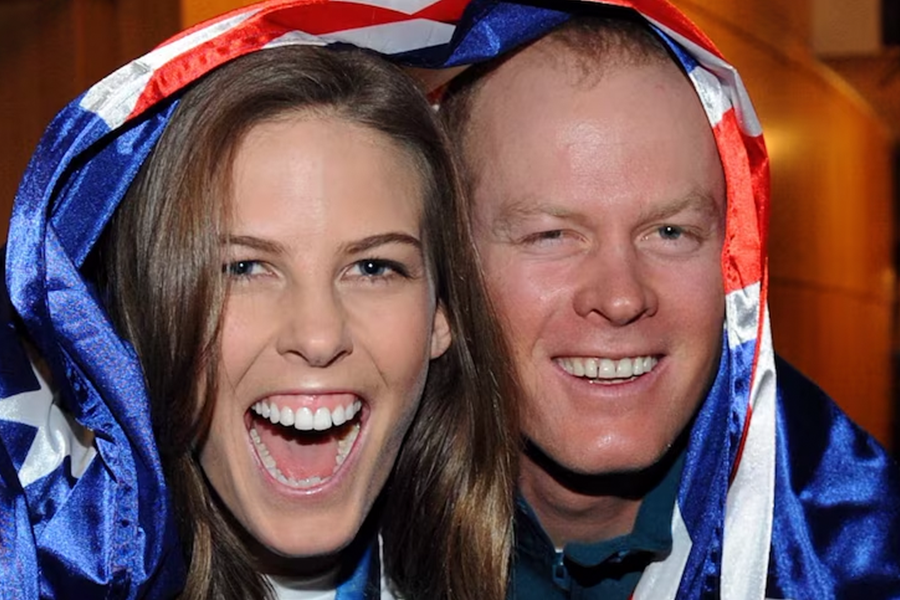Few people could lay claim to having such an impact on so many successful snowboard careers as Australia’s Benny Bright. An obvious fit within the Bright snowboard stronghold, and now on his sixth Olympic coaching campaign with a bunch of gold and silver medals to his coaching accreditation – it’s safe to say he’s the best in the game.
But it’s the very game that Benny has come to scraps with. Having been outspoken in the past, and mislabeled by media as a shit-stirrer, Benny has always harboured an undiluted pursuit to seek what’s best for snowboarding. So it might surprise you that the free-thinking yet medal-winning, somewhat controversial figure that is Ben Bright is now head coach of the Chinese snowboard team.
With so many questions needing to be asked, we wondered if we’d in turn receive orchestrated responses as part of his alliance with the Chinese empire. As it turns out, not so …

I guess the news is that you’re coaching the Chinese snowboard team this winter?
I was coaching for the Chinese national team in the last Olympics, and this time round I was hired to turn silver into gold but that hasn’t worked out yet. But now I’m coaching the whole Chinese halfpipe team and have been living in China for seven months or so …
How’s it fairing?
It’s tough on success right now. Culturally, China doesn’t like to learn how to snowboard, they like to win competitions and they compare it to basketball and swimming and figure success is simple if ‘we’ (China) build you a halfpipe, it’s simple, you should be winning-type-thing.
But snowboarding is very cerebral; you have to have a heightened level of like sense, a heightened level of spatial awareness and the halfpipe is the most demanding freestyle discipline in snowboarding, let alone at the Olympics.
You’re working with groups of people who some might have a passion for snowboarding and some might not have a passion for it, it’s been difficult to make an impact because ‘they’ don’t particularly like to snowboard, they like to do ‘halfpipe’ – does that make sense?
So you’re saying that some of the riders are purely snowboarding for the competitive aspect?
Exactly, though China has an immense love and passion for snowboarding. It’s like 90% of the participants at the Olympic Resort (The Genting Snow Park) where they hosted the Olympic Games are snowboarding, not skiing. It totally flips the switch on the entire world. So China is a snowboarding nation, they love snowboarding because of the culture behind it, because of what they see and there’s this fashion aspect and then there’s like a coolness aspect that draws them to snowboarding.

I wouldn’t have picked that, so does that mean China will become a real snowboarding stronghold?
Under the current parameters – no, I mean China has and continues to have riders that can rise to the level of the competitive world stage but until they change their thought process or the environment from the ground up when it comes to teaching and learning snowboarding, they’ll never have that impact at the very elite level.
Look at Su Yiming, he is an incredible snowboarder, but he’s not a product of the empire. He’s self-raised and he snowboards around the world. In the official Chinese snowboard team program there have been a few riders that have had competitive success whom have been produced from the ground up through the program.
“success is simple if ‘we’ (China) build you a halfpipe, it’s simple, you should be winning“
This is such a foreign concept, there’s an actual program for ‘popping out’ snowboard stars? What’s that about?
At the moment, there’s the national team and then local teams, like state teams and provincial teams. And they’re very important in China, because that’s how you can earn your way of life – through snowboarding. If you can succeed at a local level via snowboarding or another sport, then you can go on and get a chance to succeed at university and be given a pathway to life after sport. And some of the things are still in play from the past where there’d be some news coming through from the local government perhaps about a new sport that they’re going to develop a team for. And you can try out if you’re in between the ages of ‘X’ and fit all the preferences. Actually some of the current snowboarders were plucked from other sports, because they were deemed ‘athletic’.
Like talent scouting?
Right, and my vision for snowboarding is entirely different. For me, it’s not what you can do, it’s how you can do it that counts. And they’re happy to just rack it up, stack it up, get it done, and win the battle.

And you’re trying to show them this whole other side of snowboarding right?
Snowboarding is the gift that allowed me to travel the world and without it I wouldn’t have been able to live the life I live. So in China, snowboarding can be that gift, and they can compete on the world stage, go to the Olympic Games or they could go to a sports university and then become a part of something else or study engineering or something but be on a pathway to a better life. But they don’t necessarily see snowboarding as a vehicle that can give them that.
So does that mean where it’s unlikely that we’re going to see the great Chinese freerider/style icon?
It’s not impossible, but it’s a deep-seated cultural thing at the moment. If it does happen, it’ll be coming from a regional level and not from a national type athlete. When knuckle Huck becomes an Olympic sport, there’ll be a local team in every province solely training for knuckle Huck.
You think Knucklehuck will become an Olympic sport?
It will become an Olympic sport for sure. All it would take is for a nation like Norway to petition it with the FIS and then the other nations would have to vote for it. The Olympics is looking for more connection with the younger audience and get that TV time – so knuckle Huck will have its day at the Games for sure.

I know in the past, you’ve been pretty outspoken about the Olympics, and been in the media for calling out some flaws at the past games in relation to snowboarding, how are you feeling about it all now?
I actually enjoy the Olympics. I do see it as the pinnacle of sport. And that’s been misconstrued in the past because people ask shorthanded questions, but don’t want to hear the whole story. But things are going well at the Olympic level now, but it wasn’t always that way. It could have been quite simple from the beginning, but instead they just thought that they (IOC) could do it better. And so they did, for a long time. But now they actually involve the right types of people to portray snowboarding as it should be.
The way I see it, if billions of dollars are being put into it and if athletes themselves are worth millions of dollars by way of endorsement deals and success, then the arena should be of the standard that matches the level of sport, commitment and the risk as well. So there’s really been no excuse for having poor facilities.
“knuckle Huck will have its day at the (OlYMPIC) Games.”
Where do you think the freight train of competitive snowboarding is headed?
We’re coming into a different era of snowboarding where it’s never been this professional – there’s never been as much thought process in it from start to finish. The reason why snowboarding fails as a competitive entity at the moment is because it’s not professional. If you compare snowboarding to legitimate professional sports, like the MLB, NBA or the NFL, there’s an organisation behind it – the NFL doesn’t speak for the NBA, the NBA runs basketball. They have professional integrity, and they have built a strong foundation where athletes have a financial say, and have a say on how the sport is run. And the biggest thing is having a minority share of the TV rights, a minority share of what goes on. And on top of that, they have professional integrity and a duty of care that allows them to be classed as professional sports.
In snowboarding, what happens if you get injured? Well, you better have the right insurance. But didn’t you compete on the world stage? And weren’t you a part of the FIS World Tour? And isn’t that the governing body of snowboarding right now? Surley they have something in place that would assist you for life after sport, if you were so important to a sport? So these are the things that would need to be answered going forward to take ownership of the sport away from another entity, for example, if a new entity could answer, like licensing and insurance of the athletes, if a new entity could answer what happens in the event of injury? Professional snowboarding needs a structure in place, that is a professional structure.
So I say there’s a new era, because we’ve been in a low from when the TTR failed, the World Snowboard Tour failed and before that was the ISF World Tour which failed. And they were all run by separate entities. The Snowboard World Tour didn’t run like a mountain bike tour or a ski racing tour or something else. So everything went into that sport. And there’s been a lot of money that’s changed hands but the reality is that the sport of snowboarding is drip-fed every four years until it makes the big show.

“the reality is that the sport of snowboarding is drip-fed every four years”
The big show obviously being the Olympics, right?
Yeah. So when you’re drip fed … every four years snowboarding plays a part in the TV rights of the Olympic Games. So NBC and other TV stations all over the world buy the rights to broadcast the Olympics. It’s a lot of money, you’d be surprised what Australia pays for the rights … all that money, and FIS receives part of that dividend.
So my point is, the money that snowboarding earned as part of that broadcast – if it went back to that sport, solely that sport, then there would be an incredible amount of money to run a sustainable career from the ground-up; a structured competition pathway from the grassroots of every nation. And if the athletes at that Olympic Games were given a dividend based on their media coverage during that time, based on their athletic performance, then there would be a different type of energy towards the Olympics.
But the world has a problem with the unfair distribution of sport and the unfair distribution of wealth, snowboarding too. And instead, there’s now competition within competition. So you have like the FIS, the X Games League, The Snow League, Natural Selection, and the Freeride World Tour under the umbrella of FIS … All of these leagues are competing with each other, trying to tick boxes and get to broadcast. It will be a matter of survival with the best league prevailing. I think that through the competitions now in place and between those different leagues, now is the time for snowboarding to develop in professional manner.

Speaking about professionals, let’s talk about your role as snowboard coach, are you still hands-on? Do you stand up the top of the pipe with an Ipad and do cattle dog whistles?
I’m a lot different to every other coach in the game. I still actively shred, but my level of snowboarding outside of the half pipe is far greater than some of the snowboarders who I’ve coached in the past and who currently win medals as well, meaning my understanding of the mountain, the way I ride the terrain, what type of terrain I can ride, being able to read the natural terrain and yeah, I still do a lot of snowboarding.
I still ride the pipe and the jumps to a certain extent, my technical ability is freeze-frozen and I don’t learn anything new, but I can do what I could always do. You could say I’m hands-on, I don’t have an assistant coach and I’d rather not have people look at an iPad. I don’t see much of a point to it unless you’re someone like Scotty who knows exactly what they’re looking for, or unless your snowboarding IQ is exceptional and you know what you’re doing wrong and you know how to fix it.
Are you packing any top-secret snowboard training weaponry, as part of your role with China?
No … it’s a shame because there is a lot of financial firepower and it doesn’t turn into an athletic arsenal of Olympic medals. It just turns into like a butter knife in a way because everything’s so fragmented from local teams to national sporting bodies.
Japan’s had the airbags for 15 years. China’s probably had them for like maybe four years or something. There’s ideas of dry slope pipes connected to airbag facilities. And do they like work better than I thought? They kind of do, but they only work for a certain level of snowboarder. These sorts of innovative training products tend to be university projects that get funding through a sports school, or they can be a local government initiative because they need to beat the other local teams.
China has the indoor superpipe which can be very good – when shaped by the right person otherwise it’s a big ice block.
Shame, I thought you’d have some new tech to share … Talk to us about this concept of Shred IQ? What’s that?
It’s your snowboarding knowledge database and is concerned with the download speed at which a snowboarder can build a high level of IQ or understanding of snowboarding.
I’ve explained it in the past with Ayumu Hirano – where you and I have been on this dial-up speed then Ayumu comes along, and he has already downloaded everything that he needs to have, like all the data in a much shorter period of time.
Who’s packing some high IQ?
Seb Toot’s has a very high IQ, Scotty has a high IQ. But did they download that data as fast and as quick as Ayumu? Or did they get to it over time? Ayumu has a very high level of data collection and understanding because he processes things at such a high rate.
Scotty has one of the highest shred IQs in the business but it took Scotty his third Olympics to get him the medal. So it just takes the right environment, the right knowledge coming from the right teacher, the right work ethic. And then, yeah. Shred IQ. You can pick the ones that might have a higher shred IQ than others.
So when Travis Rice used to come to the US Open, for example, and he’d compete in the halfpipe or the slopestyle but he wouldn’t ride half pipe all year, but he’s been snowboarding constantly all year in the backcountry, shredding, heli, all sorts of stuff. Travis would go awesome in the halfpipe, like kick ass. But he just has feel, understanding, and knowledge that’s developed overriding different terrain, but it translates into all types of terrain.
You’d be surprised at what Scotty can do in the backcountry. And you’d be surprised how he reads the terrain in Japan. And you’d be surprised at how he’d ride in a natural selection scenario.

“Scotty has one of the highest shred IQ’s in the business …You’d be surprised at what Scotty can do in the backcountry.”
Yeah, I no doubt – Scotty in Natural Selection. I’d like that. Have you got any beef with other snowboard coaches?
I don’t have any beef with anyone. I guess my work and my connection to the snowboarders has garnered me a lot of respect from shredders or from other coaches or people who are now coaching as well. And I have mentored a number of coaches along their path as well.
Do you want to spill the beans about what you’re doing this season? You know, it’s a bit of a homecoming. I’m actually like quite surprised that you’ve got still such a strong Australian accent?
Oh, you reckon? I’m 39 now. And I’ve lived out of Australia from the age of 16 to now. So I’m excited about being in Australia. Australia is the perfect environment to grow snowboarders. We have lots of varying conditions. We have lots of different terrain. And the texture of the snow and the temperatures are perfect to lower the risk-reward ratio. So it’s a really good spot to snowboard for sure. We’ll be out for the Stomping Ground with the Chinese national team. We’ve got our spots reserved.

Can you sing the Chinese national anthem?
Yeah. I’m fluent in Mandarin though. I just don’t speak it because I like them to practice English.
So it’s true, you’re a man of many nations …
I mean I’ve had to be, this will be my six Olympic games coaching for Australia, America, Spain and now China. It’s been a real journey.
Well Australian snowboarding is looking forward to having its Benny Bright back on the grounds this season. We’ll see you then.
